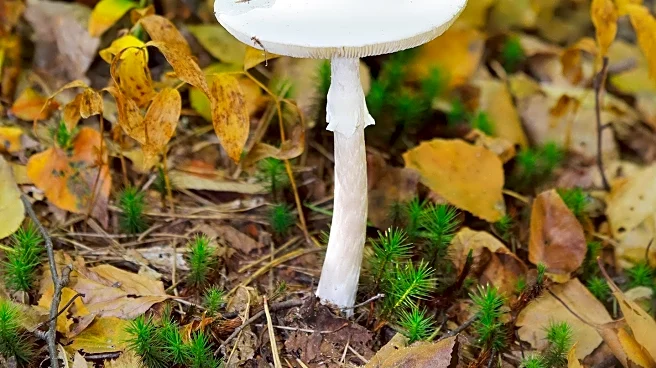What's Happening?
A recent investigation in Montchavin, a ski village in the French Alps, has linked the consumption of false morel mushrooms to a localized outbreak of amyotrophic lateral sclerosis (ALS), also known as Lou Gehrig's disease. Over the past decade, 16 villagers out of a population of 200 have been diagnosed with ALS, a rate significantly higher than the global average. The false morel, which resembles the gourmet true morel, contains toxic hydrazines that break down into neurotoxins, potentially causing neurological damage. French neurologist Emmeline Lagrange and Oregon neuroscientist Dr. Peter Spencer have been studying the connection, noting that all ALS patients had consumed false morels, while none in the control group had. This discovery raises concerns about the safety of consuming false morels, which are banned in France but considered a delicacy in other countries.
Why It's Important?
The findings from Montchavin highlight the potential dangers of consuming false morel mushrooms, which are often mistaken for their non-toxic counterparts. This revelation is significant for public health, particularly in regions where false morels are consumed. The study underscores the importance of distinguishing between true and false morels to prevent neurodegenerative diseases like ALS. The implications extend beyond France, as similar poisonings have been documented in the United States, prompting a reevaluation of food safety practices related to wild mushrooms. The research may lead to increased scrutiny and regulation of mushroom foraging and consumption, impacting culinary practices and public health policies globally.
What's Next?
The Montchavin discovery is likely to prompt further investigations into the safety of consuming false morels and other wild mushrooms. Countries where false morels are popular may reconsider their culinary practices and regulations to prevent similar outbreaks. Public health agencies might issue warnings and guidelines to educate amateur foragers on identifying and avoiding toxic mushrooms. Additionally, the research could lead to more comprehensive studies on the long-term effects of consuming false morels and other potentially harmful foods, influencing food safety standards and public health policies worldwide.
Beyond the Headlines
The Montchavin case raises ethical questions about the responsibility of local governments and health agencies in preventing food-related health crises. It also highlights the cultural dimensions of food consumption, as traditional practices may conflict with modern health standards. The situation underscores the need for balancing cultural heritage with scientific evidence to ensure public safety. Furthermore, the discovery may lead to increased collaboration between international scientists and health organizations to address food-linked neurological diseases, fostering a global approach to food safety and public health.









